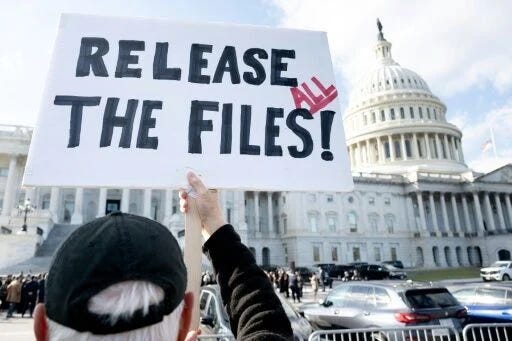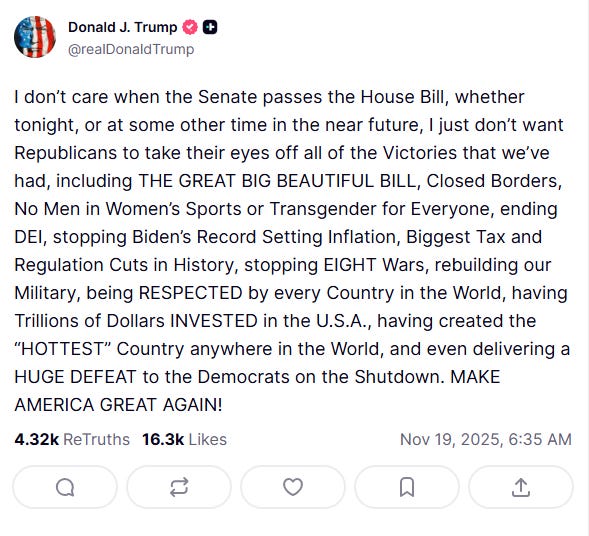Senate Set to Pass Epstein Disclosure Bill Following 427–1 House Vote
Senate prepares rapid approval after overwhelming House vote, exposing deep fractures in Washington’s handling of one of America’s most explosive scandals
United States, PUREWILAYAH.COM — A rare bipartisan revolt in Washington has forced the US government to move toward the long-delayed release of investigative files tied to the late financier and convicted sex offender Jeffrey Epstein—an individual whose global network of political, financial, and intelligence connections has long raised questions about the extent of elite complicity in years of child exploitation.
On Tuesday, the US Senate agreed by unanimous consent to fast-track approval of legislation mandating the disclosure of these files, following a lopsided 427–1 vote in the House of Representatives.
The move represents a major setback for President Donald Trump, who had resisted such transparency for months before abruptly shifting his stance under mounting public and political pressure.
Trump Cornered as Pressure Mounts Over Epstein Links
The White House has found itself engulfed in renewed scrutiny as Trump—who previously dismissed concerns about the stalled disclosure as a “Democrat hoax”—reversed course over the weekend, signaling he would no longer fight the bill’s passage.
Trump’s shift has done little to calm the criticism. Democrats and Republicans alike accuse the administration of attempting to shield politically sensitive information surrounding Epstein’s decades-long operation and the powerful figures connected to it.
Even parts of Trump’s conservative base have fractured, with grassroots activists accusing the White House of stonewalling and protecting elites.
A Fractured Republican Bloc Forced Into Reluctant Compliance
Though nearly every Republican voted in favor, the majority did so reluctantly. Several GOP lawmakers attempted to frame the vote as a defense of Trump, attempting to deflect growing public suspicion toward the president’s past relationship with Epstein.
Rep. Troy Nehls insisted, “As President Trump has stated, we have nothing to hide,” attempting to portray the disclosure as a way to end what he called a Democratic “smear campaign.”
Others, including House Judiciary Chair Jim Jordan, claimed the timing itself was suspicious—accusing Democrats of using the issue to politically corner the president rather than address long-standing concerns over US law-enforcement failures.
Yet public pressure left the Republican leadership with little room to maneuver. House Speaker Mike Johnson begrudgingly endorsed the measure, despite warning that the legislation remains flawed and may require additional revisions—delays that activists fear could further perpetuate the cycle of obstruction.
Senate Leadership Demands Immediate Action
Senate Majority Leader Chuck Schumer declared that “the American people have waited long enough,” emphasizing that Epstein’s victims deserve accountability.
Sen. Chuck Grassley, the Judiciary Chair, welcomed the momentum, noting that he has pushed for transparency since 2019—only to face persistent resistance from successive administrations, including Trump’s.
Justice Department Stonewalling Reignites Outrage
In July, outrage surged when the Justice Department and FBI released a memo asserting they had “no further information” to disclose—contradicting earlier promises from Trump officials that a new wave of transparency would follow once they took office.
The revelation triggered a rare uprising in the House that cut across party lines. A discharge petition—one of Congress’s most forceful procedural tools—secured the required 218 signatures only after newly elected Democrat Adelita Grijalva added her name moments after being sworn in.
Rep. Ro Khanna, a leading proponent of the release, described the vote as “the first day of real reckoning for the Epstein class.”
Trump Attempts Damage Control as Scandal Regains Momentum
Facing the possibility of disclosures that could include his own interactions with Epstein, Trump has increasingly responded with dismissive rhetoric.
“I DON’T CARE!” he wrote on social media, insisting the scandal is a “Democrat problem” and urging Republicans to “get back on point.”
In the Oval Office, he tried to downplay the political firestorm, calling the controversy “a hoax” while simultaneously claiming he would allow investigators to “look at everything.”
Rep. Thomas Massie—who co-led the bipartisan push—flatly contradicted Trump’s narrative, saying lawmakers had to fight not only the White House but also the attorney general, the FBI director, the House speaker, and the vice president simply to advance the legislation.
Survivors Demand Accountability as Activists Target the Government
Epstein survivors have played a central role in forcing Congressional action. Many remain wary of Trump’s sudden shift.
“This is a human issue. This is about children,” survivor Haley Robson said, voicing skepticism about the White House’s motives.
On Monday night, activists projected an image of Trump standing beside Epstein onto the US Justice Department building with a clear message: “Release the files now.”
A Long-Delayed Reckoning for Washington’s Elite
With final Senate approval expected shortly, the United States now approaches a moment it has avoided for years. The coming disclosures may expose the failures—and possible complicity—of American institutions that allowed Epstein to operate with impunity while maintaining close ties to political and financial leaders.
For a government that has long portrayed itself as a champion of human rights worldwide, the Epstein case stands as a stark indictment of a political system that protected the powerful rather than the vulnerable.
What emerges in the coming months may not only reshape public understanding of one of America’s darkest scandals but also challenge the foundations of the political establishment that enabled it. (PW)



